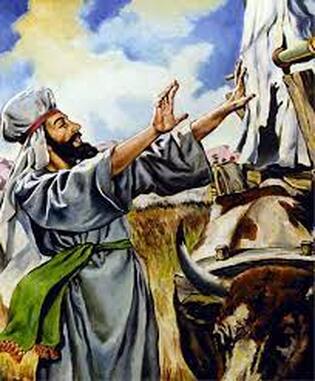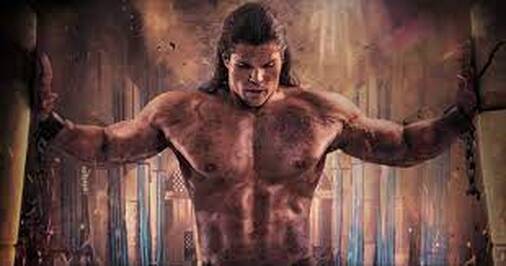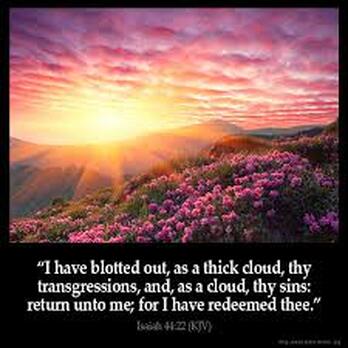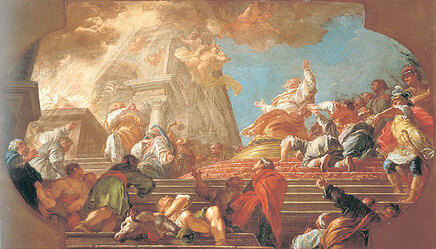ויחר־אף יהוה בעזה ויכהו שׁם האלהים על־השׁל וימת שׁם עם ארון האלהים׃
When they arrived at Nakhon's threshing-floor, the oxen stumbled; and `Uzah put out his hand to steady the ark of God. But Adonai's anger blazed up against `Uzah, and God struck him down on the spot for his offense, so that he died there by the ark of God. (2Sa 6:6-7 CJB)
David knew that his central monarchy would only stand if central religious worship for all Israel was established. So after he successfully federalizes all the tribes of Israel into one nation, our king is ready to make the Name of Lord the one and only Name worshipped in the whole nation. He will do so by bringing the Holy Ark to Jerusalem. In order for his plan to succeed, David worked with his assembly of advisers, as is written:
David consulted with the commanders of thousands and of hundreds -- with every leader. Then David said to the entire assembly of Isra'el, "If it seems good to you, and if it is the will of Adonai our God, let's send messengers to the rest of our kinsmen in the land of Isra'el, and also to the cohanim and L'vi'im in their cities with surrounding open land, asking them to join us; and let's bring back the ark of our God to ourselves, since we didn't go after it when Sha'ul was king." The whole assembly said they would do this, for in the view of all the people it seemed right.
(1Ch 13:1-4 CJB)
Here is how the story goes.
Again David summoned all the picked troops of Isra'el, 30,000 men. Then David, taking along the entire force he had with him then, set out for Ba`alei-Y'hudah to bring up from there the ark of God, which bears the Name, the name of Adonai-Tzva'ot enthroned above the k'ruvim.
(2Sa 6:2 CJB)
ABINADAB LOOSES THE ARK
Abinadab, whose house had been blessed by the presence of the Ark, was now going to lose its exclusivity.
They set the ark of God on a new cart and brought it out of the house of Avinadav on the hill, with `Uzah and Achyo, the sons of Avinadav, driving the new cart. They led it from the house of Avinadav on the hill, with the ark of God; Achyo walked in front of the ark. David and the whole house of Isra'el celebrated in the presence of Adonai with all kinds of musical instruments made of cypress-wood, including lyres, lutes, tambourines, rattles and cymbals.
(2Sa 6:5 CJB)
Why did he put it on a cart like the Philistines did when they sent it back to Israel (1 Sam 6)? Did David forget the protocols for the carrying of the Holy Ark (Ex 25:12-15; Num 4:15)? Or did he think that it was not important to carry out the commandment of the Lord exactly as He said?
SELF SACRIFICE
When they arrived at Nakhon's threshing-floor, the oxen stumbled; and `Uzah put out his hand to steady the ark of God. But Adonai's anger blazed up against `Uzah, and God struck him down on the spot for his offense, so that he died there by the ark of God. It upset David that Adonai had broken out against `Uzah; that place has been called Peretz-`Uzah [breaking-out of `Uzah] ever since.
(2Sa 6:8 CJB)
This story begs for an explanation. Many have tried to understand why HaShem killed Uzzah for trying to keep the Holy Ark from falling and maybe breaking. Here is one opinion from Daniel Lancaster:
"God did not punish Uzzah for a moral failing of shortcoming, or even an irreverent attitude of the heart. Uzzah did nothing wrong except to transgress the ritual prohibition on touching the Sacred Ark. He paid the consequences. Uzzah sacrificed his life for the sake of saving the Ark. His Heroic deed can be compared to that of a soldier who sacrifices himself by throwing his body over a live grenade to protect his comrades." -D. Lancaster, Torah Club 3, p 591
This narrative of the event proposed by Daniel Lancaster makes me think of Yeshua. Yeshua purposely put Himself in a position of sin and ritual uncleanliness knowing that it would draw enmity between Him and His Father. Knowing the full price of His decision, He still did it to protect us. Could it be the reality behind His moaning on the execution stake, ""Eli! Eli! L'mah sh'vaktani? (My God! My God! Why have you deserted me?)" in Matthew 27:46?
This section of the prophets has been chosen as a companion to this week's haftarah where the two sons of Aaron die for transgressing ritual boundaries in Leviticus 10. Again, the accounts of these tragic events may make us feel that we are in the hands of a very capricious divine being. We might need to remember HaShem's words that Moshe told Aaron about the death of his two sons, "This is what Adonai said: 'Through those who are near me I will be consecrated, and before all the people I will be glorified.' " (Lev 10:3, CJB)
We may attribute the actions of Nadab and Abihu, or of Uzzah, to disobedience, carelessness, or a cavalier attitude towards the commandments. On the other hand, we could also attribute it to unchecked passion and excitement for God, which sometimes causes us to not think about what we are doing. Nevertheless, we need to learn that in the sight of HaShem, there are boundaries that are dangerous to cross. We may think about it in terms of human relationships. We may sometimes have the best of intentions about something, but still create a mess. No one (I hope) really does something wrong by saying, "I know this is wrong but I am going to do it anyways!" The way it usually happens is that through micro-compromises, we rationalize the commandment to a point that its performance becomes irrelevant. We then tell ourselves that we know better. We use arguments such as, "This is for the greater good!", or, "I don't need to be such a legalist!", "God knows my heart"; "He understands!", or also, "This seems to be so trivial!"
DAVID, THE GOOD KING
When he saw what happened to Uzzah, as the spiritually responsible king that he was, David looked within himself. This is what a good leader of the people does. He takes responsibility for the problem. He doesn't throw it on an enemy nor even on the devil. The buck stops with him.
David saw someone die during an event that he officiated. So as a good leader he looked inside himself. He did that because he knew that as God often punishes parents through afflicting their children (David had experienced this in 2 Sam 12:15-23), he also knew that God often afflicts a king through his people. A studying of David's life shows us that at that time, David may have been a little complacent in his spiritual life and needed a little shove back in the right direction.
David was frightened of Adonai that day;he asked, "How can the ark of Adonai come to me?"
So David would not bring the ark of Adonai into the City of David; rather, David took it over to the house of `Oved-Edom the Gitti. The ark of Adonai stayed in the house of `Oved-Edom the Gitti for three months; and Adonai blessed `Oved-Edom and all his household.
(2Sa 6:9-11 CJB)
TAKE TWO
After a serious time of introspection, no doubt including his faithful prophet and conscience Nathan, David finally finishes the project of bringing the Holy Ark to its place in Jerusalem. But before he does, he prepares a place for it.
David erected buildings for himself in the City of David, prepared a place for the ark of God, and set up a tent for it. Then David said, "No one but the L'vi'im should carry the ark of God, because Adonai chose them to carry the ark of Adonai and to serve him forever." David assembled all Isra'el in Yerushalayim to bring the ark of Adonai up to its place, which he had prepared for it.
(1Ch 15:1-3 CJB)
A PARENTHESIS
This place David prepared became known as "The Tabernacle of David", a Tabernacle where service was held through means of singing praises and prayers. No doubt many of David's songs were sung there. This Tabernacle of David was later prophesied as being the place where Gentiles would come and call upon HaShem (Amos 9:11; Acts 15:15-18):
King David was told, "Adonai has blessed the house of `Oved-Edom and everyone who belongs to him, thanks to the ark of God." So David went and joyously brought the ark of God up from the house of `Oved-Edom into the City of David. (2Sa 6:12, CJB)
WILD, PRIESTLY ABANDON
Why was David wearing a ritual vest only designed for priests? Could he be a priest? Certainly not since he was from the tribe of Judah and only those descendant of Aaron from the tribe of Levy could be priests.
In this story, accompanied with its companion passage in 1 Chronicles 15 and 16, David seems to take actions that denote of priesthood yet, HaShem does not come against him like He came against Saul for officiating a sacrifice though not a priest. (1 Sam 13:8-13). It seemed that David was foreshadowing a priesthood from another order (Ps 110:4).
When those bearing the ark of Adonai had gone only six paces, he sacrificed an ox and a fattened sheep. Then David danced and spun around with abandon before Adonai, wearing a linen ritual vest. So David and all the house of Isra'el brought up the ark of Adonai with shouting and the sound of the shofar.
(2Sa 6:14-15 CJB)
David was not about to walk in with a proud, kingly strut in front of the Holy Ark from where HaShem used to speak to Moshe. Just like it is customary for one to bow in humility before a king, David chose to humble himself to the level of a commoner, to the level of those girls who danced in front of him when he returned victorious from a battle.
THE CYNISM OF THE PROUD
Mikhal, the daughter of Saul to whom David was married, seemed to have come from the same proud cloth as her father.
As the ark of Adonai entered the City of David, Mikhal the daughter of Sha'ul, watching from the window, saw King David leaping and spinning before Adonai; and she was filled with contempt for him.
. . . . . .
When David returned to bless his household, Mikhal the daughter of Sha'ul came out to meet him and said, "Such honor the king of Isra'el earned for himself today -- exposing himself before his servants' slave-girls like some vulgar exhibitionist!"
(2Sa 6:20 CJB)
David did not let Mikhal's criticism get to him.
David answered Mikhal,"In the presence of Adonai --who chose me over your father and over everyone in his family to make me chief over Adonai's people, over Isra'el --I will celebrate in the presence of Adonai! I will make myself still more contemptible than that, and I will be humiliated in my own eyes, but those slave-girls you mentioned will honor me!"
(2Sa 6:21-22 CJB)
Mikhal the daughter of Sha'ul remained childless until the day she died. (2Sa 6:23 CJB)
R' Gabriel
MAY WE LEARN FROM OUR MISTAKES AS WELL AS THE MISHAPS AROUND US.
MAY WE LEARN TO HUMBLE OURSELVES BEFORE THE GOD OF THE UNIVERSE.
R' GABRIEL




 RSS Feed
RSS Feed